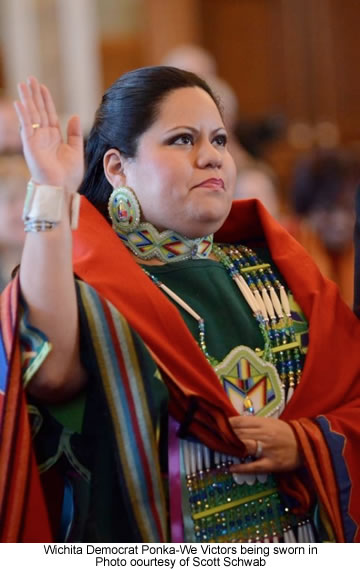 |
Canku Ota
|
 |
|
(Many Paths)
|
||
|
An Online Newsletter
Celebrating Native America
|
||
|
February 2013 - Volume
11 Number 2
|
||
|
|
||
|
Kansas State Representative
Ponka-We Victors Is a Political Warrior
|
||
|
by Lorraine Jessepe
- Indian Country
Today Media Network.com
|
||
 Wichita
Democrat Ponka-We Victors was elected to the Kansas House of Representatives
in 2010 in the face of a wave of Republican victories that swept across
the state. As a young, first-term legislator, Victors, the first American
Indian woman elected to the Kansas legislature, garnered state headlines
in 2012 when she urged colleagues to reject proposals for strict immigration-enforcement
laws during a hearing of the House Federal and State Affairs committee.
“Personally,” said Victors, “my people have been fighting
immigration since 1492. It doesn’t get any better.” Wichita
Democrat Ponka-We Victors was elected to the Kansas House of Representatives
in 2010 in the face of a wave of Republican victories that swept across
the state. As a young, first-term legislator, Victors, the first American
Indian woman elected to the Kansas legislature, garnered state headlines
in 2012 when she urged colleagues to reject proposals for strict immigration-enforcement
laws during a hearing of the House Federal and State Affairs committee.
“Personally,” said Victors, “my people have been fighting
immigration since 1492. It doesn’t get any better.”
Indian Country Today Media Network caught up with Representative Victors, 2006 Miss Indian Nations, who began her second term in the 2013 Kansas Legislature in early January. What
is your tribal affiliation? I come from humble beginnings. I was taught to appreciate my ancestors for the sacrifices they endured so that future generations would have additional opportunities. My parents provided a stable environment in order to provide me with a culture of traditions and education. Even though I was raised in Wichita, I remained close to our ceremonies and developed a desire to learn from my elders. The Tohono O’odham Nation Reservation has also been my home, and it was there that I grew to learn and treasure the value of living in both the modernized and traditional world. What
made you decide to run for political office? Congress
recently failed to reauthorize the 1994 Violence Against Women Act.
How important do you think that bill is? Now
that the Indian Health Care Improvement Act under ObamaCare has
permanent reauthorization, what changes do you see happening in
Indian health care? After
becoming governor of Kansas in 2010, Sam Brownback issued an apology
to Indian tribes of Kansas for past wrongs in dealings with the
state. Do you feel this accomplished anything meaningful for the
four tribes of Kansas? What do
you feel the chances are for an Indian to be appointed to the Supreme
Court? |
|
|
||
|
|
||
| Canku Ota is a free Newsletter celebrating Native America, its traditions and accomplishments . We do not provide subscriber or visitor names to anyone. Some articles presented in Canku Ota may contain copyright material. We have received appropriate permissions for republishing any articles. Material appearing here is distributed without profit or monetary gain to those who have expressed an interest. This is in accordance with Title 17 U.S.C. Section 107. | ||
|
Canku Ota is a copyright ©
2000 - 2013 of Vicki Williams Barry and Paul Barry.
|
||
 |
 |
|
|
The "Canku
Ota - A Newsletter Celebrating Native America" web site and
its design is the
|
||
|
Copyright ©
1999 - 2013 of Paul C. Barry.
|
||
|
All Rights Reserved.
|
||